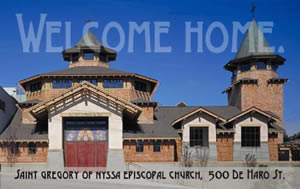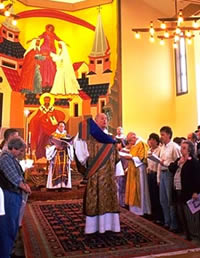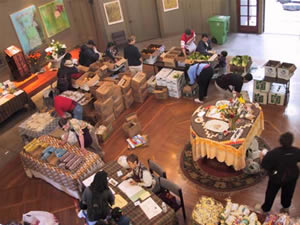Upside-down and Backward:
Finding Faith to Read Reality
For Sunday June 3, 2007
Lectionary Readings (Revised Common Lectionary, Year C)
Proverbs 8:1–4, 22–31
Psalm 8
Romans 5:1–5
John 16:12–15
 |
St. Gregory's Church in San Francisco. |
According to the church's liturgical calendar, the weeks after Pentecost are called "ordinary time." It hasn't felt ordinary.
Paul emailed that he has inoperable cancer. I've joined his friends around the world to pray for divine healing, but the human prognosis isn't good. Why has God allowed such a horrible disease to visit such a beloved saint?
Over dinner I listened with admiration as Kit described his efforts to fully express his love for his daughter Barbara who is transgendering into Bill. I left thinking how no parenting handbook could prepare you for that, and wondering whether I would be half the Christian parent as Kit if I faced similar circumstances.
While walking my dog I ran into a friend I hadn't seen in several years. He said that he was finally leaving his wife of thirty years, that his teenager was smoking pot, that their daughter had married, and that a mutual friend had left her invalid husband of thirty years. I walked home wishing I had been a better friend to my friends.
Lending a sense of the surreal to "ordinary time," Jerry Falwell died. I've been openly critical of Falwell, and in the broader public imagination he leaves a controversial legacy of fundamentalist bombast, political divisiveness, and regrettable sound bites. But now that he's dead I find it hard to think ill of him. I've pondered what people will say about me when I die, and how, after a few tears by family and friends, my brief life will be only a memory to a very few people.
Ordinary time. Ordinary people. And the extraordinary challenges of everyday life—sickness and health, a father's love for his child, marriages that flourish and fail, struggling teenagers, the death of a public figure that captures a few nano-seconds of the daily news cycle before it is eclipsed by other "stories." The Latina theologian María Isasi-Díaz describes this intersection of the sacred and the mundane, the unexpected and the unexceptional, as the "the daily thing" or "sacred ordinariness" (lo cotidiano). My friends made me grateful that I shared their Christian faith, but also left me wondering exactly what Christian authenticity looks and feels like amidst their life experiences.
 |
Worship at St. Gregory's. |
Sometimes I've prayed for the wisdom, knowledge or understanding that Proverbs 8:11 describes as invaluable and incomparable: "more precious than rubies, and nothing you desire can compare with her." Or the guidance into "all truth" that this week's Gospel mentions (John 16:13). Mostly, though, I experience human wisdom as imperfect and elusive.
The problem, as Lewis Smedes wrote twenty years ago, "is that even when we have discernment we still see things through a glass darkly. We don't have perfect discernment. And we don't have it with the same acuteness one day that we have it on another day. And we don't always know whether we have it or not—especially when someone else sees the same thing differently than the way we see it. So when we pray for discernment, we do not expect to get an infallible 20-20 sense of things going on around us. [Rather], discernment is not a kind of divine intuition that gives us infallible clairvoyance. It is a heightened power to look at and listen to what is going on in front of our eyes and see it for what it is, in all its dimensions."
Instead of crystalline clarity or spiritual platitudes about complex problems, authentic Christian wisdom invites us to a counter-intuitive and certainly a counter-cultural way of understanding. The Psalmist for this week, for example, reminds us that the God whose majesty extends to all the earth is the same God who silences the powerful with the songs of babes (8:2). Similarly, instead of despair, Paul urges his Roman readers to "rejoice in suffering," knowing that nothing can separate them from the love and grace that God has lavished on them. They have every reason to believe, says Paul, that their hope will not disappoint them (Romans 5:1–5).
In her new memoir Take this Bread Sara Miles calls this counter-intuitive wisdom a "backward" and "upside-down" way of reading reality. As a "very unlikely convert," she should know. Miles describes herself as a blue-state, secular intellectual, a lesbian with a child from a previous boyfriend, and a left-wing journalist with habits of deep scepticism. Her grandparents on both sides were missionaries, but in reaction to that upbringing her parents were actively hostile to religion. At the age of 46, Miles had never heard a Gospel reading, never said the Lord's Prayer, and knew only one person who went to church, but she walked into Saint Gregory's Episcopal Church in San Francisco, partook of the Eucharist, and experienced a radical conversion. Today she's on staff at Saint Gregory's.
 |
Take this bread. |
Building upon her life experiences as a chef, her conversion through the Eucharist, passion for the poor, and St. Gregory's vision to welcome all people without exceptions or conditions, in 2000 Miles started a food pantry at her church that gave away free bags of groceries with no questions asked and no forms to fill out. Every Friday, food for about 400 families is placed around the eucharistic altar. The miracle of the loaves multiplied and Miles went on to jump start nine more food pantries around the city.
Mundane food for the body became not only a sign of God's kingdom but, as theologians would say, the actual thing signified. Those who received wanted to give. Care for broken spirits accompanied bread for hungry bodies. Since more street people came for food than Christians came for worship, comfortable church-goers were forced to consider the Gospel imperative to "welcome the stranger."
Through all this, writes Miles, "I could sometimes grasp the backward, upside-down reality I'd sensed at Christianity's core: the frightening promise that, as the prayer said, echoing Mary's words, 'Things which were cast down are being raised up, and things which have grown old are being made new.' This was where I found my faith: a faith expressed in the wild conceit that a helpless, low-caste baby could be God. That my own neediness and misfitting, not my goodness or piety, were what God intended to use."
For further reflection:
Contemplate the so-called Peace Prayer ascribed (erroneously) to Saint Francis of Assisi (1182–1226).
Lord, make me an instrument of your peace.
Where there is hatred, let me sow love;
Where there is error, truth;
Where there is injury, pardon;
Where there is doubt, faith;
Where there is despair, hope;
Where there is darkness, light;
And where there is sadness, joy.
O Divine Master, grant that I may not so much seek
To be consoled as to console;
To be understood as to understand;
To be loved as to love.
For it is in giving that we receive;
It is in pardoning that we are pardoned;
It is in self-forgetting that we find;
And it is in dying to ourselves that we are born to eternal life.
Amen.





